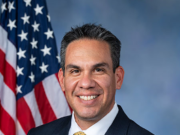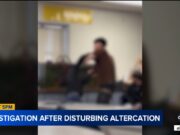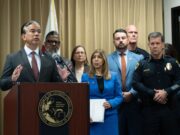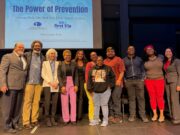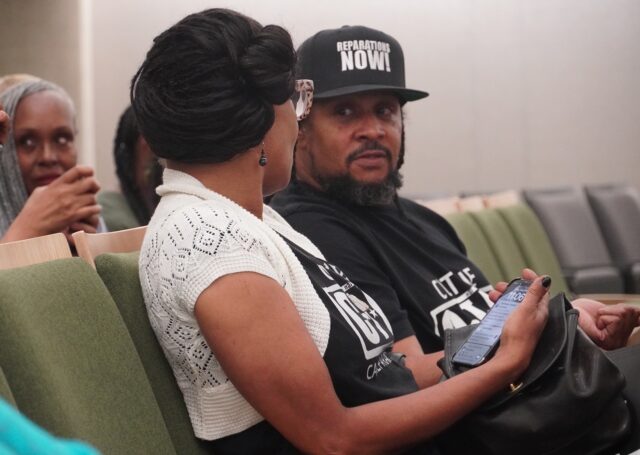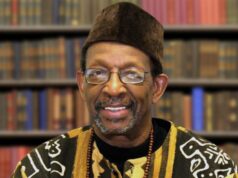By Antonio Ray Harvey | California Black Media
On August 29, three bills from the California Legislative Black Caucus (CLBC) “2025 Road to Repair” bill package were released from the Suspense File, where they were placed in July by the Assembly Appropriations Committee.
The California Legislature places any bill that would potentially cost the state more than $50,000 from the General Fund or $150,000 from special funds in the Suspense File for further consideration at a later point in the legislative session.
Senate Bills (SB) 515, SB 518, and SB 437 advanced out of the Assembly Appropriations Committee after members reviewed the bills last week.
Committee Chair, Assemblymember Buffy Wicks (D-Oakland), told California Black Media (CBM) that it is imperative that the bills get a full vote in the Senate and Assembly since they have not been deemed a financial risk.
“They were important bills from our perspective, the body’s perspective, and the leadership that we keep these bills moving along because they are important and critical,” Wicks said. “We’re always weighing the cost of something versus the impact. That’s the constant battle with all of these bills.”
Bills removed from the Suspense File advance to the Assembly floor for a vote. If approved, they move on to the Senate, where they may undergo a similar legislative process before ultimately reaching the Governor’s desk for signature or veto.
Authored by CLBC member Sen. Laura Richardson (D-Inglewood), SB 515 concerns how local governments in the state collect demographic data for employees. If passed and signed into law, beginning Jan. 1, 2027, cities and counties would be required to add new, specific categories for Black or African American ancestry when collecting demographic data.
Chris Lodgson, the lead organizer and advocate for the Coalition for a Just and Equitable California (CJEC), a grassroots reparations organization, shared his thoughts about SB 515.
“The passing of SB 515 is progress, another step in the right direction,” Lodgson said. “I’m grateful for that.”
SB 518, authored by CLBC chairperson Sen. Akilah Weber Pierson (D-San Diego), would establish the Bureau for Descendants of American Slavery within the California Department of Justice.
The Bureau proposes four sections responsible for administering reparations for descendants of American chattel slavery: Genealogy, Property Reclamation, Education and Outreach, and Legal Affairs divisions.
SB 437 would allocate up to $6 million to the California State University (CSU) system to research and establish a process for verifying genealogical eligibility for reparations.
This CLBC legislation is also authored by Weber Pierson, who has stated that the whole reparative package of bills “transforms the promise of equality into a lived reality.”
Reparations advocates attended the hour-long hearing held by Wicks and the committee, which covered 271 bills. Typically, public comment is not allowed at Assembly Appropriations’ suspense file hearings, which are intended to serve as administrative clarification sessions rather than full public debates.
Most of the advocates support Richardson’s SB 515, specifying that the bill is a significant step towards gathering more accurate information on specific Black subgroups to address historic disparities.
Since they were introduced in the CLBC package on Feb. 20, SB 518 and SB 437 have faced opposition from some reparations advocates, but they have also gained an abundance of support from community, equity, and legal organizations across the state.
The NAACP California-Hawaii State Conference, the California Asian Americans and Pacific Islanders for Civic Empowerment, and Alliance for Reparations, Reconciliation and Truth are three of numerous organizations that support the bills.
“Move these bills forward without another delay,” the NAACP Cal-Hi State Conference stated.
Reggie Romain, a well-known barber and salon owner from Temecula, California, who grew up in Los Angeles, was in Sacramento for the hearing. He is a member of Coalition For A Just and Equitable California (CJEC).
Romain and CJEC’s mobilizers for reparations and reparative justice believe SB 518 and specifically SB 437 unnecessarily delay the reparations process.
“We have to make sure they are moving everything right and that money is right,” Romain said. “But that study is something really have to watch out for because you have a starting date but no finish date. We also have to get our genealogists in these CSUs to make sure they are up in there and pay them some of that money.”
The California Legislature must pass bills on or before Sept. 12. It is the final deadline for each house to pass the bills introduced this legislative session. The bills must then be sent to Gov. Gavin Newsom, who has until Oct. 12 to sign or veto them.
“Still, passing SB 437 and SB 518 slow us down and move us backward,” Lodgson said. “The study is a waste of time and money, and we want an independent state agency that serves our community specifically and exclusively. SB 437 and SB 518 are steps in the wrong direction.”



